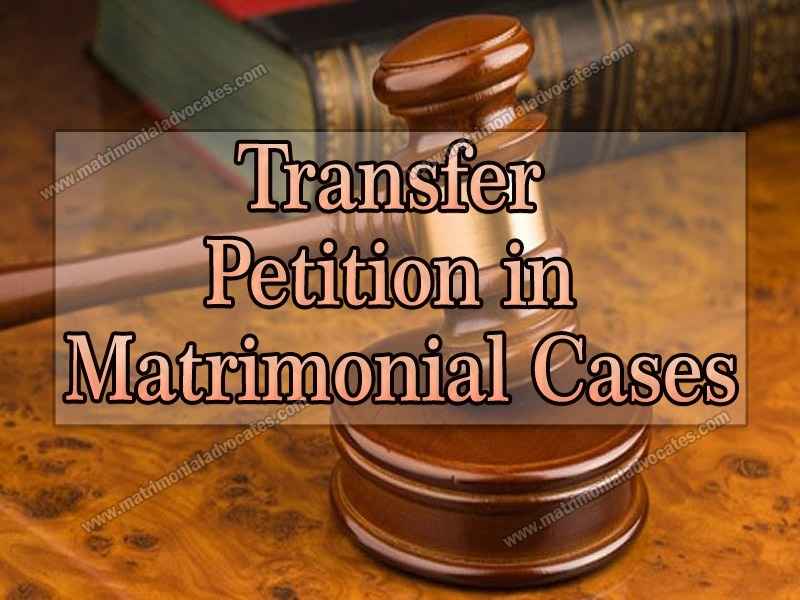
Under Section 24 and Section 25 of the Code of Civil Procedure, 1908 the High Court of a state and the Supreme Court respectively have the power to transfer any case, appeal or other proceeding to any Court in the country.
This power may be exercised by the Supreme Court if it is satisfied that an order under this Section is expedient for the ends of justice. Hence wide powers are given to the Supreme Court to order a transfer if it feels that the ends of justice so require.
This provision has been most commonly used in matrimonial cases and usually at the instance of the wife. When the husband and wife are living separately and husband files for divorce, the said divorce is filed at the place where the parties last resided with each other. The wife, who has often returned to her parental home, moves for transfer either on the ground that she cannot afford to travel or that she cannot leave her child behind or that she faces threats when she goes to defend the proceedings.
The Court invariably takes a sympathetic view towards the wife’s plea for transfer, but this is not always the case.
The grounds used by wife for filing the transfer petitions in the matrimonial cases are as follows:-
1. Prejudice in the jurisdiction
2. The wife is a single women without any financial support making it difficult for her to travel to attend court hearings.
3. If there is no support from father side then that is also a good ground for seeking transfer.
4. Medical history substantiated by proof
5. Old and ailing parents.
6. The infant in custody cannot be left alone and can not be taken care of by someone else other than the wife.
7. The wife has no source of income
8. Simultaneous jurisdiction
The grounds used by husband for filing the transfer petitions in the matrimonial cases are as follows:-
1. When the wife is living outside India.
2. When the husband has the custody of children.
3. The medical conditions of the husband is such that it makes difficult for him to travel.
4. The official duties of the husband make it difficult for him to travel.
Judgments in favour of Husband in transfer petitions in matrimonial cases
In Dr. Subramaniam Swamy versus Ramakrishna Hegde , the Supreme Court held that while deciding a transfer petition the Court must look into the balance of convenience while deciding the transfer petition and it must look into the fact that rights of other party are not compromised if the transfer petition is allowed.
The Supreme Court in Harita Sunil Parab v. State of NCT of Delhi & Ors. held that convenience of the parties does not mean the convenience of the petitioner alone who approaches the court on misconceived notions of apprehension.
For husband the judgment of Krishna Veni Nagam vs Harish Nigam is a valid defense for defending transfer petition filed before Supreme court.
It is because the Supreme, has moved away from the lenient approach of granting relief in transfer petitions and held that :
1. The petition will only be allowed if it is shown that the applicant is facing great difficulty in contesting the matter from the place where it is filed.
2. If application is not allowed then it will result in denial of justice.
3. The person against whom transfer application is filed is in the capacity to contest the matter at a different place also where he/ she did not file the case originally.
However the judgment dated 09/03/2017 was referred to a larger bench on 09/10/2017
In Santhani Vs. Vijaya Venketesh the supreme court speaking through CJI Dipak Misra and Justice Khanwilkar held the following:
On video conferencing the court held that when a case is filed for transfer relating to matrimonial disputes governed by the 1984 Act, the statutory right of a woman cannot be nullified by taking route to technological advancement and destroying her right under a law, more so, when it relates to family matters.
This judgment over ruled the Krishna
Veni Nagam vs Harish Nigam judgment.
In Anandita Das v. Sirjit Dey (2006) it was held that If the wife claims to have a minor child then grandparents can be asked to look after the child and merely on this ground the petition should not be transferred .
In Priti Sharma v. Manjeet Sharma (2005) the Supreme court, in the case of a wife seeking transfer on the grounds of being unemployed and unable commute, categorically held “merely because petitioner is a lady does not mean she cannot travel” and the transfer petition was dismissed.
Conclusion While adjudicating the transfer petitions, the Court has give due weightage to the rights of both husband and wife. There is a very line to be threaded by the Courts which is now being streamlined by judicial activism.





